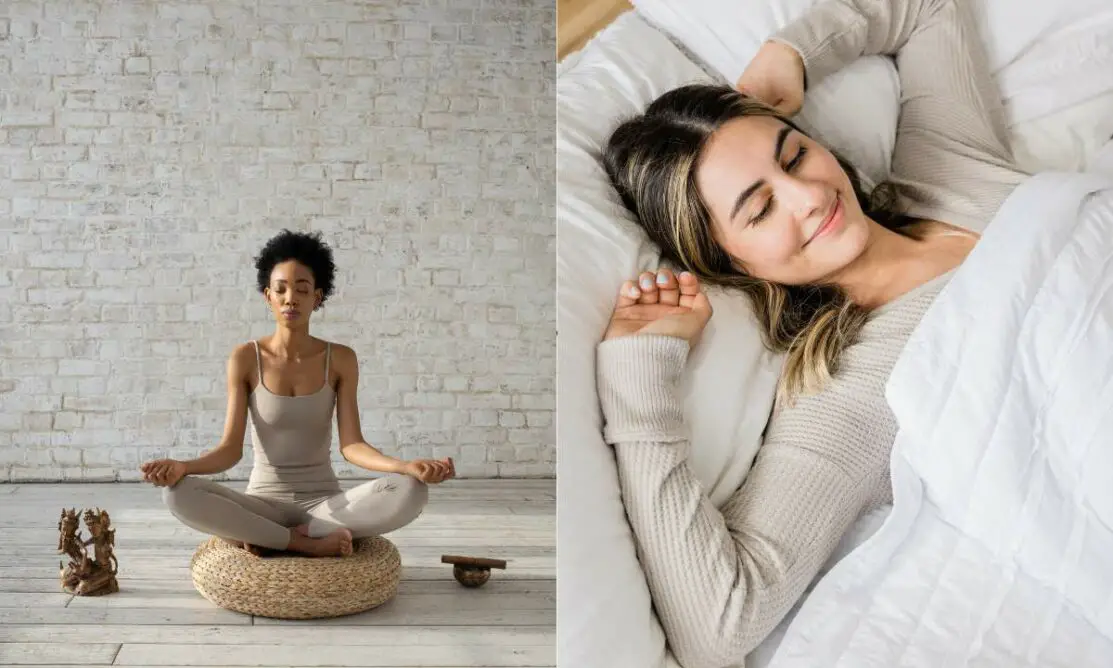Sleep and meditation are two important activities that can help us to stay healthy and balanced.
Both can help us to reduce stress, improve our mental and physical health, and increase our overall well-being.
But which one is better for us? In this article, we will explore the differences between sleep and meditation and discuss which one is better for us.
We will look at the benefits of each, the potential drawbacks, and how to make the most of both.
How to Incorporate Sleep and Meditation into Your Daily Routine for Maximum Benefits
If you’re looking to maximize the benefits of sleep and meditation, then incorporating them into your daily routine is a great way to do it.
Not only will it help you feel more energized and productive, but it can also help reduce stress and improve your overall well-being.
Here are some tips on how to make sleep and meditation part of your daily routine.
Start by setting a consistent bedtime.
This will help your body get into a rhythm and make it easier to fall asleep.
Aim to go to bed and wake up at the same time each day, even on weekends.
Create a relaxing bedtime routine. This could include taking a warm bath, reading a book, or listening to calming music.
This will help your body and mind wind down and prepare for sleep.
Make sure your bedroom is conducive to sleep.
Keep it dark, cool, and free of distractions like TVs and phones.
Take time to meditate before bed. This can help clear your mind and relax your body, making it easier to drift off to sleep.
If you’re having trouble sleeping, try taking a short nap during the day.
This can help you feel more energized and alert. Just make sure to keep it to 20 minutes or less.
Incorporate meditation into your morning routine.
This can help you start your day with a clear mind and a positive attitude.
Take regular breaks throughout the day to practice mindfulness. This can help you stay focused and productive.
By making sleep and meditation part of your daily routine, you can reap the maximum benefits and enjoy improved wellbeing. Give it a try and see how it works for you!

The Pros and Cons of Sleep vs. Meditation: Which is Better for Stress Relief?
When it comes to stress relief, it can be hard to decide between sleep and meditation.
Both have their pros and cons, so it’s important to consider which one is best for you.
Let’s take a look at the pros and cons of sleep and meditation to help you decide which one is better for stress relief.
The Pros of Sleep
Sleep is essential for our physical and mental health.
It helps us to recharge and restore our energy levels, and it can also help to reduce stress.
When we get enough sleep, our bodies are better able to cope with stress and our minds are better able to process information.
Sleep also helps to improve our mood and can even help to boost our immune system.
The Cons of Sleep
The downside of sleep is that it can be difficult to get enough of it. If you’re having trouble sleeping, it can be hard to get the rest you need.
Also, if you’re not getting enough sleep, it can lead to fatigue and irritability, which can make it harder to cope with stress.
The Pros of Meditation
Meditation is a great way to reduce stress and anxiety.
It helps to clear your mind and can help you to focus on the present moment.
It can also help to improve your mood and can even help to reduce physical pain.
Meditation can also help to improve your sleep quality, so it’s a great way to get the rest you need.
The Cons of Meditation
The downside of meditation is that it can be difficult to learn and can take some time to master.
It can also be hard to find the time to practice it regularly.
Also, if you’re not used to meditating, it can be hard to stay focused and it can be easy to get distracted.
So, which is better for stress relief? Ultimately, it depends on your individual needs and preferences.
If you’re having trouble sleeping, then meditation might be a better option for you.
However, if you’re able to get enough sleep, then sleep might be the better option. Ultimately, it’s important to find the right balance between sleep and meditation to ensure that you’re getting the rest and relaxation you need.
How to Balance Sleep and Meditation for Optimal Mental and Physical Well-Being
If you’re looking to improve your mental and physical well-being, you’ve probably heard that sleep and meditation are two of the best ways to do it.
But how do you balance the two?
After all, it’s hard to meditate when you’re exhausted, and it’s hard to sleep when your mind is racing.
The good news is that it’s possible to get the best of both worlds.
Here are some tips for balancing sleep and meditation for optimal mental and physical well-being.
1. Make Sleep a Priority
Getting enough sleep is essential for your mental and physical health.
Aim for 7-9 hours of sleep each night, and make sure you’re getting quality sleep.
Avoid screens before bed, and create a relaxing bedtime routine that helps you wind down.
2. Schedule Time for Meditation
Meditation can help reduce stress and improve your mental clarity. Schedule time for meditation each day, and stick to it. Even just 10 minutes of meditation can make a big difference.
3. Find the Right Time for Meditation
Some people find that meditating in the morning helps them start the day with a clear mind.
Others prefer to meditate in the evening, as a way to relax and unwind before bed. Experiment to find the best time for you.
4. Take Breaks During the Day
If you’re feeling overwhelmed or stressed, take a break. Step away from your work and take a few minutes to meditate or just relax. This can help you reset and refocus.
5. Listen to Your Body
Your body knows what it needs. If you’re feeling tired, take a nap or go to bed early. If you’re feeling energized, take advantage of that energy and meditate.
Listen to your body and give it what it needs.
Balancing sleep and meditation can be challenging, but it’s worth it.
With a little practice, you can find the perfect balance for optimal mental and physical well-being.
Exploring the Benefits of Sleep vs. Meditation: Which is Better for Your Health?
We all know that getting enough sleep and taking time to meditate are both important for our overall health and wellbeing.
But which one is better for you? In this blog post, we’ll explore the benefits of both sleep and meditation and see which one is the better choice for your health.
Let’s start with sleep. Getting enough sleep is essential for our physical and mental health. It helps us to stay alert and focused during the day, and it also helps to reduce stress and anxiety.
Sleep also helps to boost our immune system, which can help us to fight off illnesses and stay healthy.
On the other hand, meditation can also be beneficial for our health. It can help to reduce stress and anxiety, and it can also help to improve our focus and concentration.
Meditation can also help to improve our mood and increase our sense of well-being.
So which one is better for your health?
The answer is that both sleep and meditation are important for our health, and it’s important to make sure that you get enough of both.
However, if you’re looking for something that can help you to reduce stress and anxiety, then meditation may be the better choice.
On the other hand, if you’re looking for something that can help you to stay alert and focused during the day, then sleep may be the better choice.
Ultimately, the best thing you can do for your health is to make sure that you get enough of both sleep and meditation.
Both of these activities can help to improve your overall health and well-being, so make sure to make time for both of them in your daily routine.
Conclusion
Ultimately, it is up to the individual to decide which is better for them – sleep or meditation.
Both have their own benefits and drawbacks, and it is important to consider one’s own lifestyle and needs when making a decision.
Sleep is essential for physical and mental health, while meditation can help to reduce stress and improve focus.
Ultimately, it is important to find a balance between the two that works best for you.



